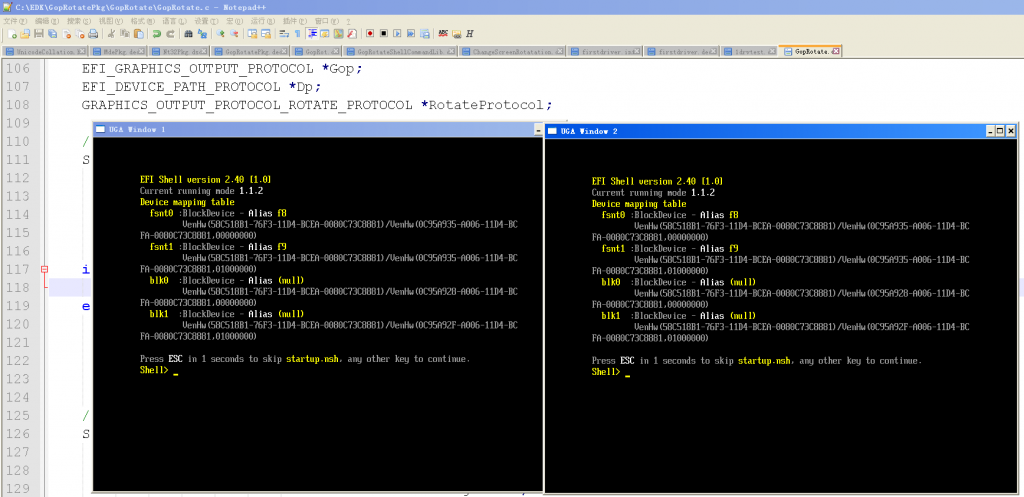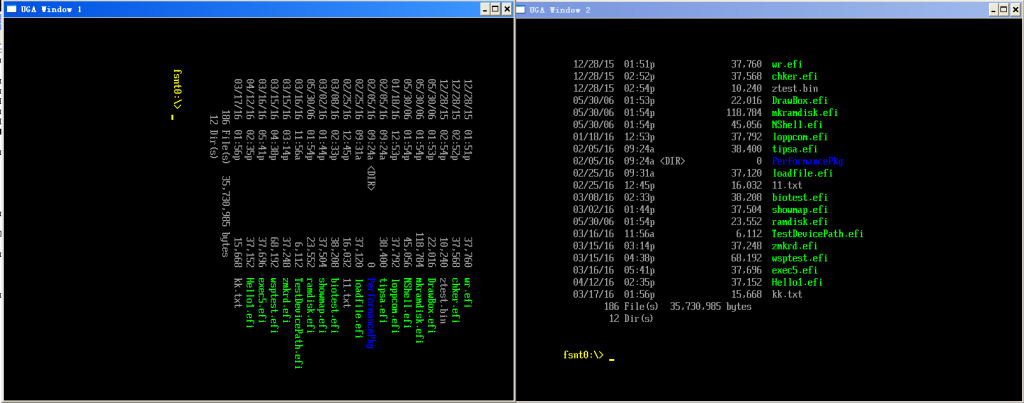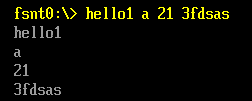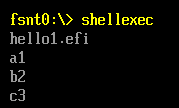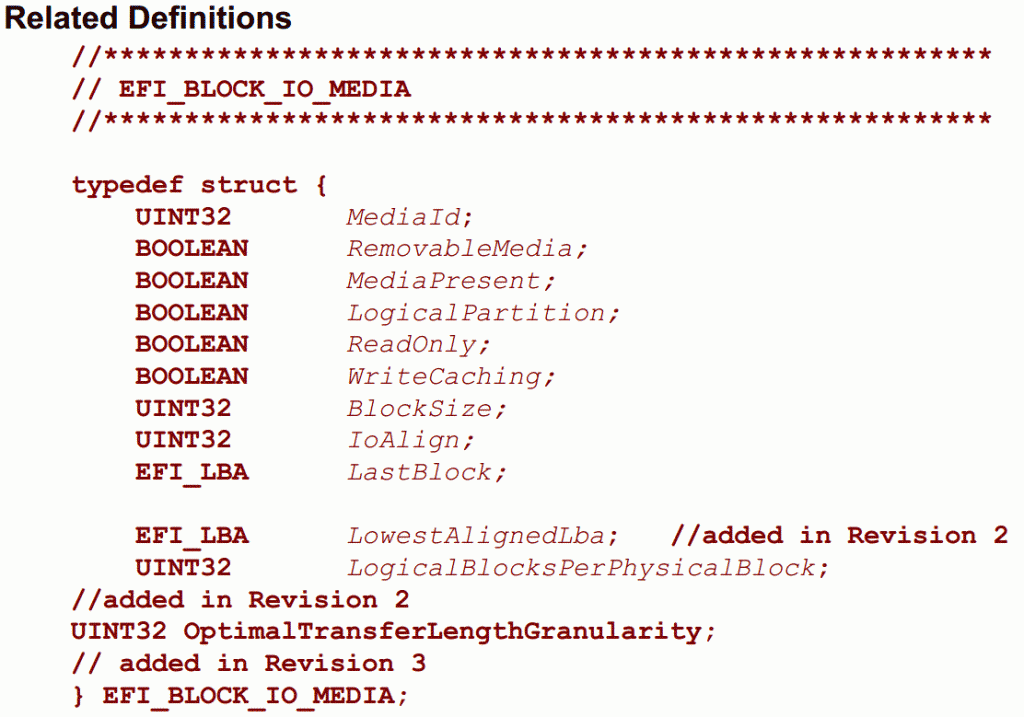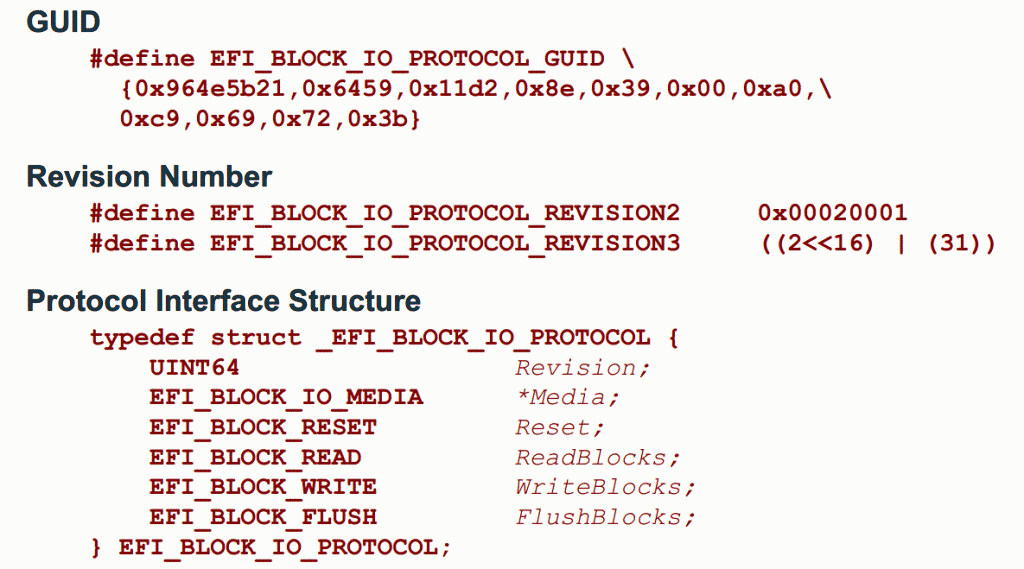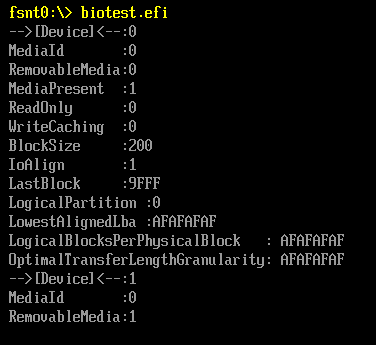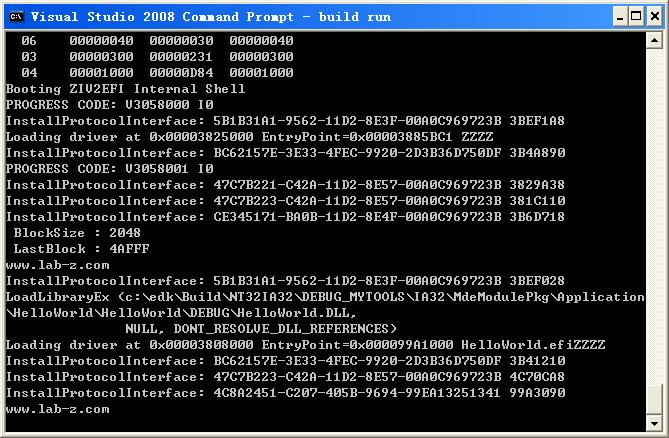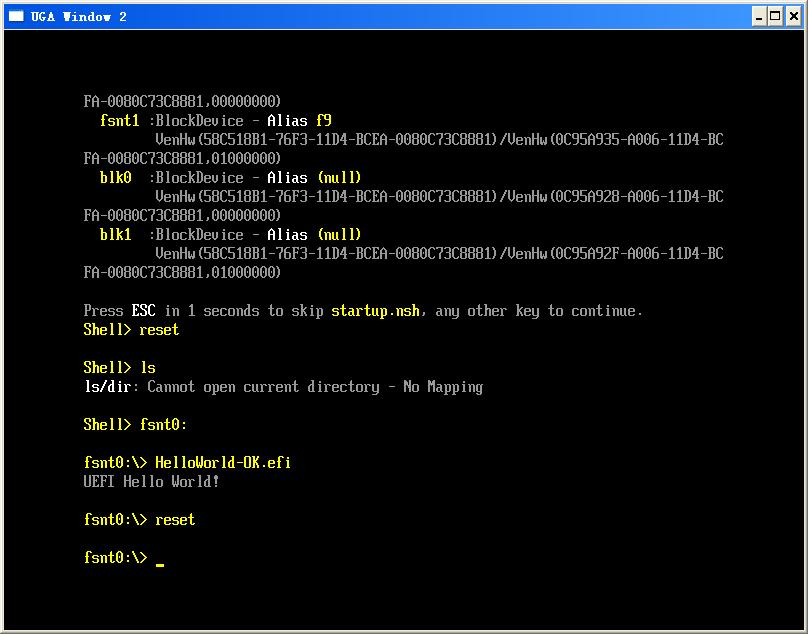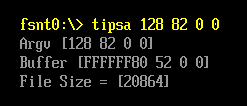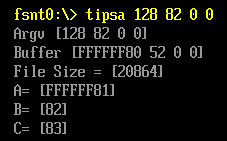之前文章中提到过,用LoadImage和StartImage无法加载CLIB build出来的 Application。这次认真研究一下这个问题。
首先,准备实验的材料: 两个简单的小程序 Hello1 和 Hello2 。前者是 CLIB 编出来的,后者是普通的EFI 程序。此外还有一个加载器程序 exec4.efi 。
1. 单独执行编译出来的 Hello1.efi 和Hello2.efi都没问题。实验 exec4 ,加载 hello1.efi 会出错,虚拟机会重启到 Setup中,加载 hello2.efi 正常;
2. 对 Hello1 进行分析,分析的方法是加入【参考1】提到的那种按键Pause。
2.1 在Build\NT32IA32\DEBUG_MYTOOLS\IA32\AppPkg\Applications\Hello1\Hello1\Makefile文件中可以看到,入口定义:
IMAGE_ENTRY_POINT = _ModuleEntryPoint
2.2 我们再根据编译过程生成的MAP文件,确定 _ModuleEntryPoint 是在 ApplicationEntryPoint.c 中。同样【参考2】可以给我们提供很多经验,相比普通的EFI程序,增加的CLib只是在整个架构中插入了多函数,并不会改变整体的架构。
/**
Entry point to UEFI Application.
This function is the entry point for a UEFI Application. This function must call
ProcessLibraryConstructorList(), ProcessModuleEntryPointList(), and ProcessLibraryDestructorList().
The return value from ProcessModuleEntryPointList() is returned.
If _gUefiDriverRevision is not zero and SystemTable->Hdr.Revision is less than _gUefiDriverRevison,
then return EFI_INCOMPATIBLE_VERSION.
@param ImageHandle The image handle of the UEFI Application.
@param SystemTable A pointer to the EFI System Table.
@retval EFI_SUCCESS The UEFI Application exited normally.
@retval EFI_INCOMPATIBLE_VERSION _gUefiDriverRevision is greater than SystemTable->Hdr.Revision.
@retval Other Return value from ProcessModuleEntryPointList().
**/
EFI_STATUS
EFIAPI
_ModuleEntryPoint (
IN EFI_HANDLE ImageHandle,
IN EFI_SYSTEM_TABLE *SystemTable
)
{
EFI_STATUS Status;
if (_gUefiDriverRevision != 0) {
//
// Make sure that the EFI/UEFI spec revision of the platform is >= EFI/UEFI spec revision of the application.
//
if (SystemTable->Hdr.Revision < _gUefiDriverRevision) {
return EFI_INCOMPATIBLE_VERSION;
}
}
//
// Call constructor for all libraries.
//
ProcessLibraryConstructorList (ImageHandle, SystemTable);
//
// Call the module's entry point
//
Status = ProcessModuleEntryPointList (ImageHandle, SystemTable);
//
// Process destructor for all libraries.
//
ProcessLibraryDestructorList (ImageHandle, SystemTable);
//
// Return the return status code from the driver entry point
//
return Status;
}
首先追到的是 ProcessLibraryConstructorList 我们在其中插入Debug信息。特别注意,插入的位置在 \Build\NT32IA32\DEBUG_MYTOOLS\IA32\AppPkg\Applications\Hello1\Hello1\DEBUG\AutoGen.c
因为这个文件是编译过程中生成的,所以我们不可以重新 Build AppPkg,而要在目录中(\Build\NT32IA32\DEBUG_MYTOOLS\IA32\AppPkg\Applications\Hello1\Hello1\) 直接运行 NMake来编译;
2.3 插入Debug信息后,NMAKE 编译通过,直接运行 Hello1.efi 一次,确保没问题,再用 exec4 加载 hello1.efi 。同样有错误,这说明问题不是发生在ProcessLibraryConstructorList 中;下面是插入后的代码式样:
VOID
EFIAPI
ProcessLibraryConstructorList (
IN EFI_HANDLE ImageHandle,
IN EFI_SYSTEM_TABLE *SystemTable
)
{
EFI_STATUS Status;
EFI_INPUT_KEY Key;
SystemTable->ConOut->OutputString(SystemTable->ConOut,L"UefiRuntimeServicesTableLibConstructor\n\r");
Key.ScanCode=SCAN_NULL;
while (SCAN_UP!=Key.ScanCode)
{Status= SystemTable -> ConIn -> ReadKeyStroke(SystemTable->ConIn,&Key);}
SystemTable->ConOut->OutputString(SystemTable->ConOut,L"Waiting for DOWN_KEY\n\r");
Key.ScanCode=SCAN_NULL;
while (SCAN_DOWN!=Key.ScanCode)
{Status= SystemTable -> ConIn -> ReadKeyStroke(SystemTable->ConIn,&Key);}
Status = UefiRuntimeServicesTableLibConstructor (ImageHandle, SystemTable);
ASSERT_EFI_ERROR (Status);
SystemTable->ConOut->OutputString(SystemTable->ConOut,L"UefiBootServicesTableLibConstructor\n\r");
Key.ScanCode=SCAN_NULL;
while (SCAN_UP!=Key.ScanCode)
{Status= SystemTable -> ConIn -> ReadKeyStroke(SystemTable->ConIn,&Key);}
SystemTable->ConOut->OutputString(SystemTable->ConOut,L"Waiting for DOWN_KEY\n\r");
Key.ScanCode=SCAN_NULL;
while (SCAN_DOWN!=Key.ScanCode)
{Status= SystemTable -> ConIn -> ReadKeyStroke(SystemTable->ConIn,&Key);}
Status = UefiBootServicesTableLibConstructor (ImageHandle, SystemTable);
ASSERT_EFI_ERROR (Status);
SystemTable->ConOut->OutputString(SystemTable->ConOut,L"UefiLibConstructor\n\r");
Key.ScanCode=SCAN_NULL;
while (SCAN_UP!=Key.ScanCode)
{Status= SystemTable -> ConIn -> ReadKeyStroke(SystemTable->ConIn,&Key);}
SystemTable->ConOut->OutputString(SystemTable->ConOut,L"Waiting for DOWN_KEY\n\r");
Key.ScanCode=SCAN_NULL;
while (SCAN_DOWN!=Key.ScanCode)
{Status= SystemTable -> ConIn -> ReadKeyStroke(SystemTable->ConIn,&Key);}
Status = UefiLibConstructor (ImageHandle, SystemTable);
ASSERT_EFI_ERROR (Status);
SystemTable->ConOut->OutputString(SystemTable->ConOut,L"__wchar_construct\n\r");
Key.ScanCode=SCAN_NULL;
while (SCAN_UP!=Key.ScanCode)
{Status= SystemTable -> ConIn -> ReadKeyStroke(SystemTable->ConIn,&Key);}
SystemTable->ConOut->OutputString(SystemTable->ConOut,L"Waiting for DOWN_KEY\n\r");
Key.ScanCode=SCAN_NULL;
while (SCAN_DOWN!=Key.ScanCode)
{Status= SystemTable -> ConIn -> ReadKeyStroke(SystemTable->ConIn,&Key);}
Status = __wchar_construct (ImageHandle, SystemTable);
ASSERT_EFI_ERROR (Status);
SystemTable->ConOut->OutputString(SystemTable->ConOut,L"ShellLibConstructor \n\r");
Key.ScanCode=SCAN_NULL;
while (SCAN_UP!=Key.ScanCode)
{Status= SystemTable -> ConIn -> ReadKeyStroke(SystemTable->ConIn,&Key);}
SystemTable->ConOut->OutputString(SystemTable->ConOut,L"Waiting for DOWN_KEY\n\r");
Key.ScanCode=SCAN_NULL;
while (SCAN_DOWN!=Key.ScanCode)
{Status= SystemTable -> ConIn -> ReadKeyStroke(SystemTable->ConIn,&Key);}
Status = ShellLibConstructor (ImageHandle, SystemTable);
ASSERT_EFI_ERROR (Status);
SystemTable->ConOut->OutputString(SystemTable->ConOut,L"UefiHiiServicesLibConstructor \n\r");
Key.ScanCode=SCAN_NULL;
while (SCAN_UP!=Key.ScanCode)
{Status= SystemTable -> ConIn -> ReadKeyStroke(SystemTable->ConIn,&Key);}
SystemTable->ConOut->OutputString(SystemTable->ConOut,L"Waiting for DOWN_KEY\n\r");
Key.ScanCode=SCAN_NULL;
while (SCAN_DOWN!=Key.ScanCode)
{Status= SystemTable -> ConIn -> ReadKeyStroke(SystemTable->ConIn,&Key);}
Status = UefiHiiServicesLibConstructor (ImageHandle, SystemTable);
ASSERT_EFI_ERROR (Status);
}
直接运行程序会不断暂停等待按键才继续:

2.4 接下来在ProcessModuleEntryPointList中像上面一样插入Debug,
//
// Call the module's entry point
//
Status = ProcessModuleEntryPointList (ImageHandle, SystemTable);
EFI_STATUS
EFIAPI
ProcessModuleEntryPointList (
IN EFI_HANDLE ImageHandle,
IN EFI_SYSTEM_TABLE *SystemTable
)
{
EFI_STATUS Status;
EFI_INPUT_KEY Key;
SystemTable->ConOut->OutputString(SystemTable->ConOut,L"ShellCEntryLib \n\r");
Key.ScanCode=SCAN_NULL;
while (SCAN_UP!=Key.ScanCode)
{Status= SystemTable -> ConIn -> ReadKeyStroke(SystemTable->ConIn,&Key);}
SystemTable->ConOut->OutputString(SystemTable->ConOut,L"Waiting for DOWN_KEY\n\r");
Key.ScanCode=SCAN_NULL;
while (SCAN_DOWN!=Key.ScanCode)
{Status= SystemTable -> ConIn -> ReadKeyStroke(SystemTable->ConIn,&Key);}
Status=ShellCEntryLib (ImageHandle, SystemTable);
SystemTable->ConOut->OutputString(SystemTable->ConOut,L"ShellCEntryLib Exit \n\r");
Key.ScanCode=SCAN_NULL;
while (SCAN_UP!=Key.ScanCode)
{Status= SystemTable -> ConIn -> ReadKeyStroke(SystemTable->ConIn,&Key);}
SystemTable->ConOut->OutputString(SystemTable->ConOut,L"Waiting for DOWN_KEY\n\r");
Key.ScanCode=SCAN_NULL;
while (SCAN_DOWN!=Key.ScanCode)
{Status= SystemTable -> ConIn -> ReadKeyStroke(SystemTable->ConIn,&Key);}
return EFI_SUCCESS;
}
再次实验 Exec4 加载发现,现象消失了。仔细琢磨一下,应该是我最后 return EFI_SUCCESS 导致的。所以问题就应该发生在进入 ShellCEntryLib 那里。
2.5 继续调试直接在 ShellCEntryLib 加入 Debug 信息
/**
UEFI entry point for an application that will in turn call the
ShellAppMain function which has parameters similar to a standard C
main function.
An application that uses UefiShellCEntryLib must have a ShellAppMain
function as prototyped in Include/Library/ShellCEntryLib.h.
Note that the Shell uses POSITIVE integers for error values, while UEFI
uses NEGATIVE values. If the application is to be used within a script,
it needs to return one of the SHELL_STATUS values defined in ShellBase.h.
@param ImageHandle The image handle of the UEFI Application.
@param SystemTable A pointer to the EFI System Table.
@retval EFI_SUCCESS The application exited normally.
@retval Other An error occurred.
**/
EFI_STATUS
EFIAPI
ShellCEntryLib (
IN EFI_HANDLE ImageHandle,
IN EFI_SYSTEM_TABLE *SystemTable
)
{
INTN ReturnFromMain;
EFI_SHELL_PARAMETERS_PROTOCOL *EfiShellParametersProtocol;
EFI_SHELL_INTERFACE *EfiShellInterface;
EFI_STATUS Status;
ReturnFromMain = -1;
EfiShellParametersProtocol = NULL;
EfiShellInterface = NULL;
Status = SystemTable->BootServices->OpenProtocol(ImageHandle,
&gEfiShellParametersProtocolGuid,
(VOID **)&EfiShellParametersProtocol,
ImageHandle,
NULL,
EFI_OPEN_PROTOCOL_GET_PROTOCOL
);
if (!EFI_ERROR(Status)) {
SystemTable->ConOut->OutputString(SystemTable->ConOut,L"Shell2\n\r");
//
// use shell 2.0 interface
//
ReturnFromMain = ShellAppMain (
EfiShellParametersProtocol->Argc,
EfiShellParametersProtocol->Argv
);
} else {
SystemTable->ConOut->OutputString(SystemTable->ConOut,L"Shell1\n\r");
//
// try to get shell 1.0 interface instead.
//
Status = SystemTable->BootServices->OpenProtocol(ImageHandle,
&gEfiShellInterfaceGuid,
(VOID **)&EfiShellInterface,
ImageHandle,
NULL,
EFI_OPEN_PROTOCOL_GET_PROTOCOL
);
if (!EFI_ERROR(Status)) {
SystemTable->ConOut->OutputString(SystemTable->ConOut,L"Shell1.1\n\r");
//
// use shell 1.0 interface
//
ReturnFromMain = ShellAppMain (
EfiShellInterface->Argc,
EfiShellInterface->Argv
);
} else {
SystemTable->ConOut->OutputString(SystemTable->ConOut,L"Shell fail\n\r");
ASSERT(FALSE);
}
}
return ReturnFromMain;
}
直接运行,输出如下:

用exec4加载之后输出如下:

可以看到,两种方式下,运行路径是不同的。
最后的结论:产生问题的原因是,当我们用 StartImage 运行一个 CLib程序的时候,Clib带入的函数找不到 Efi Shell Interface (要用这个Interface 的原因是希望取命令行参数传给被调用者)。找不到的时候就报错,报告一个加载不成功。
本文提到的 hello1 hello2 exec4 的源代码下载:
exec4
Hello2
Hello1
参考:
1.http://www.lab-z.com/utpk/ UEFI Tips 用按键做Pause
2.http://www.lab-z.com/22applicationentry/ Application的入口分析








